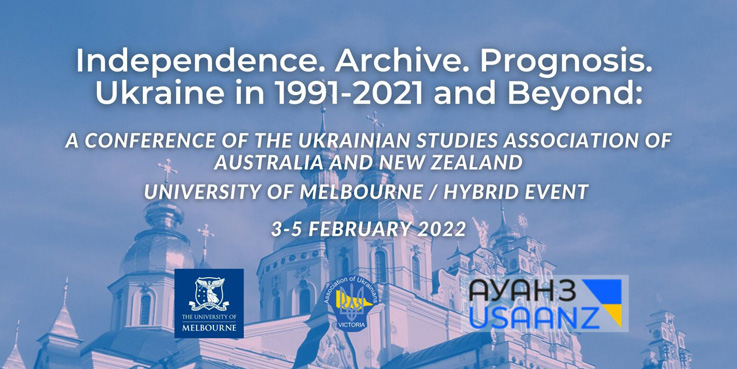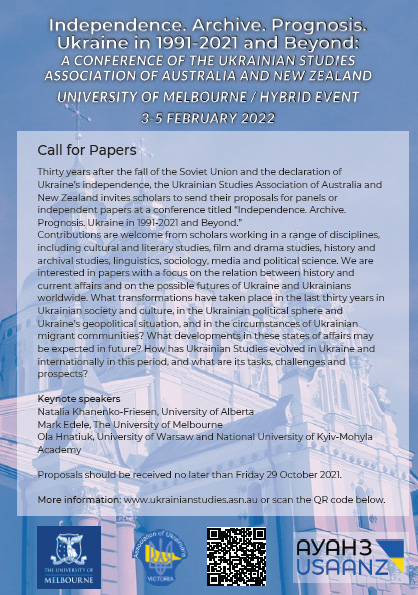

Independence. Archive. Prognosis. Ukraine in 1991-1931 and Beyond:
A conference of the Ukrainian Studies Association of Australia and New Zealand in partnership with The University of Melbourne and the Association of Ukrainians in Victoria, Australia.
3-5 February 2022
Thirty years after the fall of the Soviet Union and the declaration of Ukraine’s independence, the Ukrainian Studies Association of Australia and New Zealand invites scholars to send their proposals for panels or independent papers at a conference titled “Independence. Archive. Prognosis. Ukraine in 1991-2021 and Beyond.”
Contributions are welcome from scholars working in a range of disciplines, including cultural and literary studies, film and drama studies, history and archival studies, linguistics, sociology, media and political science. We are interested in papers with a focus on the relation between history and current affairs and on the possible futures of Ukraine and Ukrainians worldwide. What transformations have taken place in the last thirty years in Ukrainian society and culture, in the Ukrainian political sphere and Ukraine’s geopolitical situation, and in the circumstances of Ukrainian migrant communities? What developments in these states of affairs may be expected in future? How has Ukrainian Studies evolved in Ukraine and internationally in this period, and what are its tasks, challenges and prospects?
We are particularly interested in the impact of archival practices on our understanding of Ukraine’s past and present. What kind of archives pertaining to Ukraine and its culture are available to scholars and the general public, both in Ukraine and abroad? How have they been impacted by Ukraine’s independence and how can they help us better understand the historic(al) changes engendered by the transformations of the late 1980s and early 1990s? What image of Ukraine and its many faces in the diaspora do they convey? What role should archives play in preserving the heritage of Ukrainian migrant communities? Could more archival research provide us with a better understanding of Ukrainian culture than has been the case so far? Can reflections on the concept of the archive by Foucault, Derrida and others contribute to our grasp of Ukrainian realia? We hope that a productive exchange between the many research areas of Ukrainian Studies will contribute to our understanding of these fascinating issues.
The conference will be held in hybrid mode. Sessions may be wholly online, wholly at the conference venue at The University of Melbourne [Parkville campus], or partly in-person and partly online. In the event of government restrictions, the conference may be held entirely online.
Keynote speakers
Natalia Khanenko-Friesen, University of Alberta
Mark Edele, The University of Melbourne
Ola Hnatiuk, University of Warsaw and National University of Kyiv-Mohyla Academy
Proposals
Proposals may be for panels (either three or two presenters and a discussant), for individual papers or for roundtables. English will be the working language of the conference.
Proposals should be sent to the conference address, conference2022@ukrainianstudies.asn.au, no later than Friday 29 October 2021.
The Organising Committee will give notification of the acceptance or otherwise of proposals by 12 November.
Proposals for panels will include the title of the panel, the name and e-mail address of the panel organiser, an indication of times suitable for holding the panel (see below) and, for each panel participant and discussant, the person’s name, institutional affiliation, e-mail address, title of paper (where applicable), abstract of paper (where applicable, no more than 250 words), and an autobiographical statement (no more than 100 words).
Proposals for individual papers will include the presenter’s name and e-mail address, an indication of times suitable for presenting the paper (see below), the title of the proposed paper, an abstract of no more than 250 words, and an autobiographical statement of no more than 100 words.
Proposers of roundtables should contact the Organising Committee through theconference e-mail address.
Timing
Times of conference sessions will be, approximately, 9:00 – 11:00, 11:30 – 13:30, 14:30 – 16:30 and 19:00 – 21:00 Australian Eastern Daylight Time (UTC+11:00).
Proposers of panels, as well as individual papers, are invited to indicate in their applications the range of times that would be suitable for them (e.g.: “We can participate online between 7 a.m. and 10 p.m. Berlin time.”)
Presenters of papers will speak for 20 minutes, discussants for 10.
Registration Fee
There will be no registration fee.
Organising Committee
Alessandro Achilli (University of Cagliari, Italy; Ukrainian Studies Association of Australia and New Zealand), chair
Julie Fedor (The University of Melbourne)
Olena Nedozhogina (The University of Melbourne)
Yana Ostapenko (Monash University, Association of Ukrainians in Victoria)
Marko Pavlyshyn (Monash University)
Andrew Radion (Ukrainian Studies Association of Australia and New Zealand)
Olha Shmihelska (Ukrainian Studies Association of Australia and New Zealand)
Dmytro Yesypenko (University of Alberta)
Conference website
http://www.ukrainianstudies.asn.au/events/conference2022-cfp/
